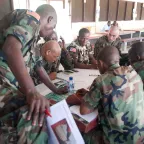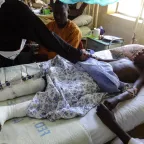Burkina Faso – food, water and health care are scarce
… basic services, particularly food, water and health care, under increasing strain. The population … and basic facilities –¬ such as schools, health-care centres and markets – have been …
… basic services, particularly food, water and health care, under increasing strain. The population … and basic facilities –¬ such as schools, health-care centres and markets – have been …

… while preserving people's access to health-care services. In true military fashion, the … manuals, and so on. Read: Health Care in Danger newsletter, July – November 2015 …

… of the stories told by the new set of five Health Care in Danger posters. Based on real cases, they show …
… Representatives of health ministries, medical associations, … committed to work on ensuring that health care is safe from disruption and violence in … Maciej Polkowski, head of the Health Care in Danger (HCiD) initiative at International …
… global surveillance system, 105 attacks on health-care facilities, personnel or resources were … we must keep up the momentum. Health Care in Danger is an initiative of the International …

… Access to health care is not always safe in the Niger Delta … elsewhere in Nigeria. The rate of attacks on health-care providers, facilities and … recounted how his life had been put in danger as he conducted operations under fire, …

… We continue to sound the alarm. Scores of health-care workers are being killed or injured while … of and partners in the Health Care in Danger initiative, welcome the action taken by …
… and facilities so they can save lives. Our Health Care in Danger project seeks better protection for …

… of the stories told by the new set of five Health Care in Danger posters. Based on real cases, they show …

… at the launch of our "Ethical principles of health care in times of armed conflict and other … Crescent Movement, began the Health Care in Danger project. The latest report on violent …
Try one of the following resources:
Created in 1863, the ICRC library, alongside the ICRC archives, provides an indispensable documentary reference on the organization itself and international humanitarian law.
International humanitarian law is based on a number of treaties, in particular the Geneva Conventions of 1949 and their Additional Protocols, and a series of other instruments.
Customary international humanitarian law consists of rules that come from "a general practice accepted as law" and that exist independent of treaty law.